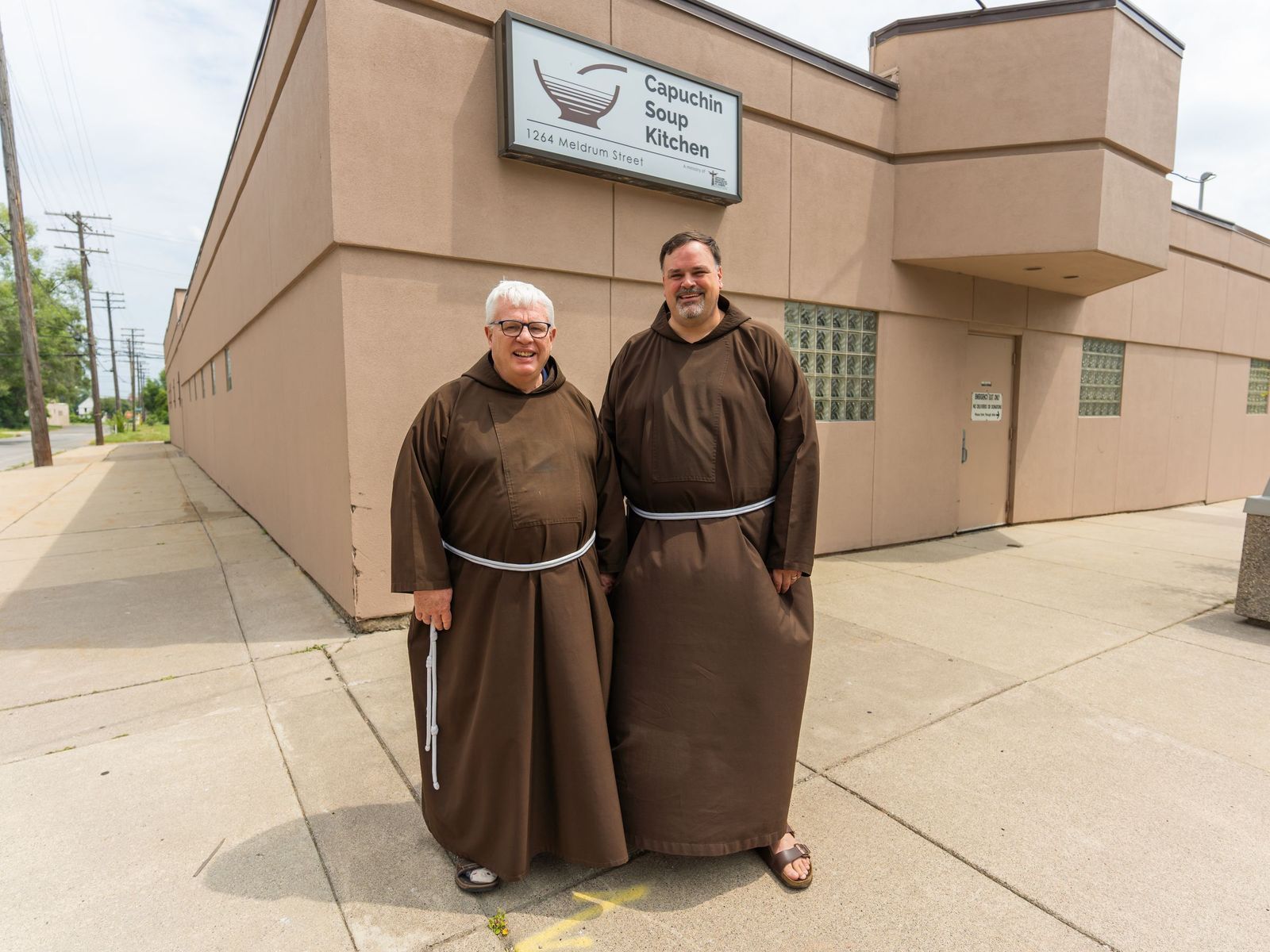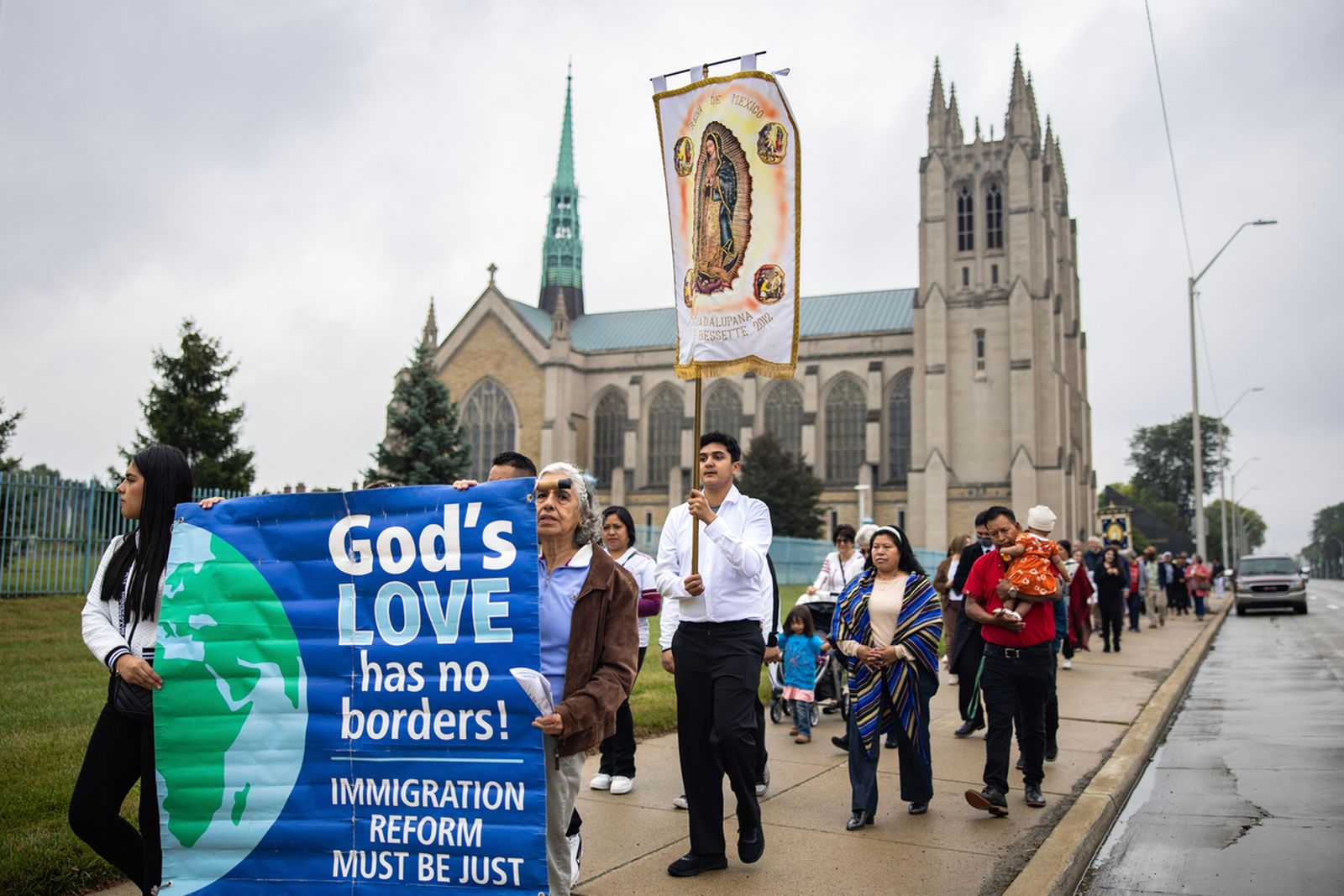Catholic groups dedicated to serving homeless, migrants, unborn say Pope Francis' example inspired their work
DETROIT — As millions throughout the world grieve the passing of Pope Francis, who died on Easter Monday, April 21, at the age of 88, many find that mixed with their grief is both gratitude and celebration for all Pope Francis accomplished.
Pope Francis’ care "in particular for those who live in the peripheries" set an example for many individuals and organizations who work for social good, and for some Detroiters, it changed the trajectory of their work to care for the most vulnerable forever.
The Pope Francis Center, previously known as the SS. Peter and Paul Warming Center, changed its name to honor the pope in 2016, reflecting the late pope’s deep compassion for the poor and the marginalized, as the center also expanded its services.
The center has been operating next to SS. Peter and Paul (Jesuit) Parish in downtown Detroit since 1990 and regularly serves more than 200 guests daily with meals, shower facilities, and counseling from professionals who serve guests' housing, legal, medical, and dental needs.
The center’s many employees and volunteers are grieving the death of their namesake, said Fr. Tim McCabe, SJ, president and CEO, but there is also a deep sense of gratitude for the pope's witness.
“He really reset the Church’s focus on caring for the poor and the marginalized,” Fr. McCabe told Detroit Catholic.
Inspired by the example set by Pope Francis, the ministry changed its name just three years after the pope's election to communicate its desire to imitate the pope's ministry of mercy, Fr. McCabe said.

“At that time, Pope Francis was installing showers and bathrooms in the Vatican area for people who were experiencing homelessness there, so I thought, 'What better name than the man who cares so deeply and passionately about the poor and those who are suffering?'” Fr. McCabe said.
Fr. McCabe said the Pope Francis Center will hold a Mass on April 24 to celebrate the pope’s life, and will continue to honor him through its work.
“I hope that all of us will continue to work together to care for the least among us: the poor, the suffering, the marginalized, and those without a voice,” Fr. McCabe said. “We must make sure that they are front and center of the Church’s mission, that we make sure that they feel loved and cared for and treated with dignity and respect. Going forward, I hope that his legacy will continue through our work and through so many other good works in his name.”
Paul Propson, CEO of Catholic Charities of southeast Michigan, told Detroit Catholic that throughout Pope Francis’ 12-year papacy, he has seen an “elevation” of attention paid to the poorest among us, thanks to the pope’s spoken and lived example.
Many of Catholic Charities' ministries were formed or expanded thanks to Pope Francis' example, Propson said. In 2021, Detroit Archbishop-emeritus Allen H. Vigneron blessed the new Center for the Works of Mercy on Woodward Avenue, a one-stop shop to serve individuals needing services.
“We've certainly worked to make Catholic Charities a place where the people Jesus sees and the people Pope Francis sees are being loved and served,” Propson said. “Catholic Charities has responded to Pope Francis' call to the corporal works of mercy.”

While Pope Francis' was hailed for modernizing the Church and its structures, Propson said the pope's teachings about the poor and vulnerable echoed the age-old teaching of the Church and its founder.
“His call to serve the poor and to love our neighbor is nothing new; he was reminding us of Jesus’ commands, and he also was reminding us of St. Francis,” Propson said. “Pope Francis’ legacy will certainly endure because it recollected the Gospel, and the Gospel will endure.”
Bro. Gary Wegner, OFM Cap, executive director of the Capuchin Soup Kitchen in Detroit, said Pope Francis truly embodied a witness to the Gospel through his actions.
Bro. Wegner specifically recalled the pope’s first Holy Thursday as pontiff. He surprised people by beginning the Triduum at an Italian men’s prison, where he got down on his knees and washed the inmates' feet. Over the years, he continued to eschew the tradition of celebrating the Mass at St. Peter’s and spent his Holy Thursdays washing the feet of hospital patients and prisoners, including at a women's prison.
“He was really amazing in his gestures, which reinforced for us what he was about and what he wanted us to be about,” Bro. Wegner said. “Those are things that touched me — his willingness to do that not just by words, but his own deeds, his own actions.”
Jesus' command to feed the poor, visit those in prison and care for the sick were not abstract principles to Pope Francis, but concrete, living commands, Bro. Wegner said.

“He tried to show that those aren’t just words, so he went to hospitals to visit the sick, he went to prisons to be with those who were incarcerated,” Bro. Wegner said. “He wasn’t about judgment — whether a particular person ought to be in prison or not be in prison — he simply went to be with them because they were in prison. I don’t know how you can get any more Gospel than that.”
Bill O'Brien, executive director of Strangers No Longer, a ministry that advocates for humane immigration policies, said Pope Francis offered clear guideposts for how to welcome and care for immigrants and refugees, as well.
“Pope Francis had a four-step process to receive and welcome immigrant brothers and sisters: welcome, promote, protect, and integrate,” O’Brien explained.
Over the years, O’Brien said the group, founded in 2017 and inspired by the pope, has worked to make these steps a reality in southeast Michigan. Today, Strangers No Longer works not only to welcome immigrant families into parish life, but to form relationships to understand their stories, and even to include migrants in the group's decision-making processes.
O’Brien said earlier this year, Strangers No Longer created a statewide council of immigrants who advise and make decisions on behalf of the group.
Pope Francis' example has encouraged the group to continue their work, O’Brien added, but he was much more than just the “friendly, mercy pope.”

“He gave specific directions in terms of how to go beyond charity into justice and decision-making,” O’Brien said.
Pope Francis’ pastoral directives have reached parishes and individuals all over the world, and that is where the change and progress can actually be made, said Fr. Lorn Snow, SJ, pastor of Gesu Parish, a Jesuit-run parish in northwest Detroit.
“Pope Francis saw himself as a pastor, and that’s how he carried out his ministry: as our pastor, as our shepherd,” Fr. Snow said.
While the pope's death is heartbreaking, it's important to celebrate that he served the Church well, Fr. Snow said.
“(He) leaves a legacy of mission and reaching out to the most vulnerable and those on the periphery of our world, and has proclaimed their value and dignity,” Fr. Lorn said of the pope, a fellow Jesuit. “He has really brought us together as a Church, and I think that is part of his pastoral ministry.”
While Pope Francis taught people how to walk with their vulnerable brothers and sisters, he also preached about the importance of solidarity, a timeless Catholic teaching, Fr. Snow added.
“Solidarity is about being with those who are the periphery; it’s being church with one another,” Fr. Snow said. “Early Christian communities all came together, and (now we) all can work on this together and bring forth the reign of God in our midst.”
Copy Permalink
papal transition










